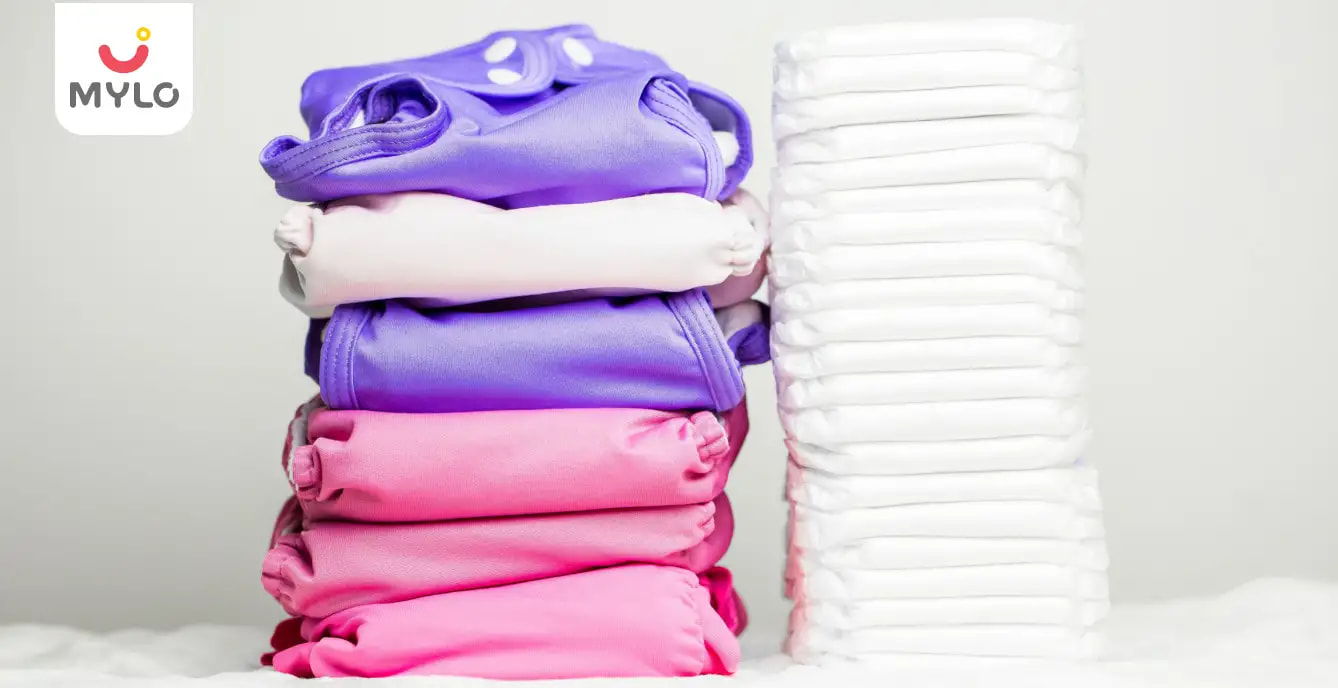Home

Diapering

Diapers vs Cloth Nappies: Which Is the Best Choice for Your Baby?
In this Article

Diapering
Diapers vs Cloth Nappies: Which Is the Best Choice for Your Baby?
Updated on 3 November 2023
When it comes to the well-being of our little ones, every decision we make holds immense importance. As parents, choosing the right diapers for our babies is an essential aspect of their care. The decision between diapers vs cloth nappies is a dilemma faced by many parents around the world.
In this article, we will explore the advantages and disadvantages of both diapers and cloth nappies, helping you make an informed decision that suits your baby's comfort, your budget, and the environment.
Pros of Baby Cloth Nappies
Here are the key advantages of using cloth nappies for your little one:
1. Eco-Friendly Option
One of the main advantages of using baby cloth nappies is their positive impact on the environment. Unlike diapers, which are made from synthetic materials and contribute to landfill waste, cloth nappies are reusable. This means less waste being generated and fewer resources being consumed.
2. Cost-Effective Solution
Another benefit of cloth nappies is their cost-effectiveness. While the initial investment may be higher compared to buying disposable diapers, cloth nappies can save you money in the long run.
3. Reduced Chemical Exposure
Disposable diapers often contain chemicals such as dyes, fragrances, and absorbent gels. These chemicals can come into contact with your baby's sensitive skin, potentially causing irritation or allergic reactions. Cloth nappies, on the other hand, are free from these harmful substances.
4. Better for Baby's Skin
Cloth nappies are made from soft, breathable fabrics that are gentle on your baby's delicate skin. The natural fibers used in cloth nappies are also less likely to cause friction or chafing, keeping your baby's skin healthy and happy.
5. Earlier Toilet Training
Some parents believe that using cloth nappies can facilitate earlier toilet training for their babies. The reasoning behind this is that cloth nappies provide a more noticeable sensation when wet or soiled compared to the super-absorbent disposable diapers. This increased awareness can help babies associate the need to use the toilet at an earlier stage, potentially leading to quicker and easier toilet training in the future.
You may also like: Cloth Diaper vs Disposable: Which is Best for Your Baby?
5 Cons of Cloth Nappies
While baby cloth nappies have multiple advantages, they are not without some disadvantages, such as:
1. Increased Laundry Workload
One of the main drawbacks of using cloth nappies is the increased laundry workload. Cloth nappies need to be washed after each use, which can be time-consuming and require more effort compared to simply throwing away a disposable diaper.
2. Initial Investment
While cloth nappies can save you money in the long run, there is an initial investment involved. Purchasing a set of cloth nappies and the necessary accessories, such as liners and covers, can be more expensive upfront compared to buying a pack of disposable diapers.
3. Need for Storage Space
Cloth nappies require storage space in your home. Unlike disposable diapers that can be easily discarded, cloth nappies need to be stored until they can be washed. This means you will need to allocate a dedicated area in your home for storing the soiled nappies.
4. Potential for Leaks
Cloth nappies, especially if not fitted properly, can have a higher risk of leakage compared to disposable diapers. It may take some trial and error to find the right fit and absorbency level for your baby.
Additionally, cloth nappies may require more frequent changes, especially for heavy wetters, to prevent leaks. This can be challenging when you're on the go or during nighttime diaper changes.
5. Limited Availability in Some Situations
While cloth nappies are becoming more popular, they may still be less readily available in certain situations. For example, when traveling, using cloth nappies may require additional planning and access to laundry facilities.
You may also like: How Often Should You Change Baby’s Diaper?
5 Pros of Baby Diapers
Here are the key advantages of using diapers for your little one:
1. Convenience and Ease of Use
One of the main advantages of using disposable diapers is their convenience and ease of use. They are readily available in stores and can be easily disposed of after use. This makes them a practical choice for busy parents or when traveling.
2. Time-Saving Solution
Diapers can save you time and effort as they eliminate the need for frequent laundry. With disposable diapers, you can simply remove them and throw them away, without the need for soaking, washing, or drying.
3. High Absorbency
Disposable diapers are designed to be highly absorbent, which helps keep your baby dry and comfortable for longer periods. The absorbent core in disposable diapers quickly pulls moisture away from your baby's skin, reducing the risk of diaper rash and keeping them feeling fresh.
4. Wide Availability
They are widely available in supermarkets, pharmacies, and online stores. This accessibility makes it easy to find and purchase diapers whenever you need them, without the need for additional planning or storage space.
5. Disposable Options for Specific Needs
Disposable diapers offer specialized options for specific needs, such as overnight diapers or diapers for sensitive skin. These options cater to different situations and can provide additional comfort and protection for your baby.
You may also like: Debunking the Top 8 Myths About Diapering with Cloth Diapers
5 Cons of Diapers
While baby diapers have multiple advantages, they are not without some disadvantages, such as:
1. Environmental Impact
One of the main drawbacks of using disposable diapers is their impact on the environment. Diapers are made from synthetic materials that take a long time to decompose in landfills. The production and disposal of disposable diapers also contribute to pollution and resource depletion.
2. Cost Over Time
While disposable diapers may seem more affordable in the short term, their cost can add up over time. The ongoing expense of purchasing disposable diapers can become a significant financial burden, especially for families on a tight budget.
3. Potential for Chemical Exposure
Disposable diapers often contain chemicals such as dyes, fragrances, and absorbent gels. These chemicals can come into contact with your baby's skin and potentially cause allergic reactions or skin irritations.
4. Increased Risk of Diaper Rash
Disposable diapers can trap moisture and heat against your baby's skin, creating an environment that promotes the growth of bacteria and fungi. This can increase the risk of diaper rash and other skin irritations.
5. Dependency on Disposal Facilities
Using disposable diapers requires access to proper disposal facilities. Improper disposal of diapers can lead to pollution and health risks. It's important to dispose of used diapers responsibly, following local waste management guidelines.
You may also like: Things to Remember While Choosing Disposable Diaper Pants for Your Baby
How to Choose Between Diapers vs Cloth Nappies?
Now that you know the pros and cons of the two, let’s understand how to choose which one is best for your baby:
1. Lifestyle and Convenience
Consider your lifestyle and daily routine when choosing between diapers and cloth nappies. If you have a busy schedule or frequently travel, disposable diapers may offer more convenience. On the other hand, if you have the time and resources to dedicate to washing and maintaining cloth nappies, they can be a suitable choice.
2. Environmental Impact
Evaluate the environmental impact of your diapering choice. If reducing waste and minimizing your carbon footprint are important to you, cloth nappies may be the better option.
3. Cost Considerations
Cloth nappies require an initial investment but can save you money over time. Disposable diapers, while more affordable upfront, can result in ongoing expenses. Assess your financial situation and determine which option aligns better with your budget and priorities.
4. Baby's Skin Sensitivity
Take into account your baby's skin sensitivity when making your decision. If your baby has sensitive skin or is prone to allergies, cloth nappies may be a gentler and safer choice. On the other hand, if your baby has not shown any sensitivities or reactions to disposable diapers, they may be a suitable option for your little one.
5. Accessibility and Availability
Consider the availability of cloth nappies and disposable diapers in your area. If cloth nappies are readily available and you have easy access to laundry facilities, they may be a viable option. However, if disposable diapers are more easily accessible or required in specific situations, it may be more convenient to use them.
The Bottomline
Choosing between diapers vs cloth nappies is a personal decision that depends on various factors, including your lifestyle, environmental concerns, budget, and your baby's needs. Each option has its own advantages and disadvantages, and what works best for one family may not be the ideal choice for another. Whether you choose cloth nappies or disposable diapers, the most important thing is to ensure your baby's comfort, health, and well-being.

Mylo Baby Diaper Pants (S) Size – 12-Hour Leak-Proof Protection for Happy Babies
Lightweight | Rash Free | 12 Hours Protection | ADL Technology
₹ 423

4.4
(93057)


156589 Users bought



Written by
Anandita Sharma
Drawing on more than a decade of expertise in administration, Anandita Sharma currently serves as a content operations e
Read MoreGet baby's diet chart, and growth tips

Related Articles
Related Questions
Hello frnds..still no pain...doctor said head fix nhi hua hai..bt vagina me pain hai aur back pain bhi... anyone having same issues??

Kon kon c chije aisi hai jo pregnancy mei gas acidity jalan karti hain... Koi btayega plz bcz mujhe aksar khane ke baad hi samagh aata hai ki is chij se gas acidity jalan ho gyi hai. Please share your knowledge

I am 13 week pregnancy. Anyone having Storione-xt tablet. It better to have morning or night ???

Hlo to be moms....i hv a query...in my 9.5 wk i feel body joint pain like in ankle, knee, wrist, shoulder, toes....pain intensity is high...i cnt sleep....what should i do pls help....cn i cosult my doc.

Influenza and boostrix injection kisiko laga hai kya 8 month pregnancy me and q lagta hai ye plz reply me

Related Topics
RECENTLY PUBLISHED ARTICLES
our most recent articles

Diet & Nutrition
গর্ভাবস্থায় আলুবোখরা: উপকারিতা ও ঝুঁকি | Prunes During Pregnancy: Benefits & Risks in Bengali

Diet & Nutrition
গর্ভাবস্থায় হিং | ঝুঁকি, সুবিধা এবং অন্যান্য চিকিৎসা | Hing During Pregnancy | Risks, Benefits & Other Treatments in Bengali

Women Specific Issues
স্তনের উপর সাদা দাগ: লক্ষণ, কারণ এবং চিকিৎসা | White Spots on Nipple: Causes, Symptoms, and Treatments in Bengali

Diet & Nutrition
গর্ভাবস্থায় পোহা: উপকারিতা, ধরণ এবং রেসিপি | Poha During Pregnancy: Benefits, Types & Recipes in Bengali

Diet & Nutrition
গর্ভাবস্থায় মাছ: উপকারিতা এবং ঝুঁকি | Fish In Pregnancy: Benefits and Risks in Bengali

Diet & Nutrition
গর্ভাবস্থায় রেড ওয়াইন: পার্শ্ব প্রতিক্রিয়া এবং নির্দেশিকা | Red Wine During Pregnancy: Side Effects & Guidelines in Bengali
- ইনার থাই চ্যাফিং: কারণ, উপসর্গ এবং চিকিৎসা | Inner Thigh Chafing: Causes, Symptoms & Treatment in Bengali
- গর্ভাবস্থায় ব্রাউন রাইস: উপকারিতা ও সতর্কতা | Brown Rice During Pregnancy: Benefits & Precautions in Bengali
- Velamentous Cord Insertion - Precautions, Results & Safety
- Unlock the Secret to Flawless Skin: 7 Must-Have Qualities in a Face Serum
- Unlock the Secret to Radiant Skin: How Vitamin C Serum Can Transform Your Complexion
- Gender No Bar: 10 Reasons Why Everyone Needs a Body Lotion
- Unlock the Secret to Radiant Skin How to Choose the Perfect Body Lotion for Your Skin Type
- Top 10 Reasons to Apply a Body Lotion After Every Bath
- Communication in Toddlers: Milestones & Activities
- How to Improve Vocabulary for Toddlers?
- A Comprehensive Guide to Understanding Placenta Accreta
- Vulvovaginitis in Toddlers Causes, Symptoms and Treatment
- A Comprehensive Guide to Understanding Cerebral Palsy in Children
- Bitter Taste in Mouth During Pregnancy: Understanding the Causes and Remedies


AWARDS AND RECOGNITION

Mylo wins Forbes D2C Disruptor award

Mylo wins The Economic Times Promising Brands 2022
AS SEEN IN

- Mylo Care: Effective and science-backed personal care and wellness solutions for a joyful you.
- Mylo Baby: Science-backed, gentle and effective personal care & hygiene range for your little one.
- Mylo Community: Trusted and empathetic community of 10mn+ parents and experts.
Product Categories
baby carrier | baby soap | baby wipes | stretch marks cream | baby cream | baby shampoo | baby massage oil | baby hair oil | stretch marks oil | baby body wash | baby powder | baby lotion | diaper rash cream | newborn diapers | teether | baby kajal | baby diapers | cloth diapers |




